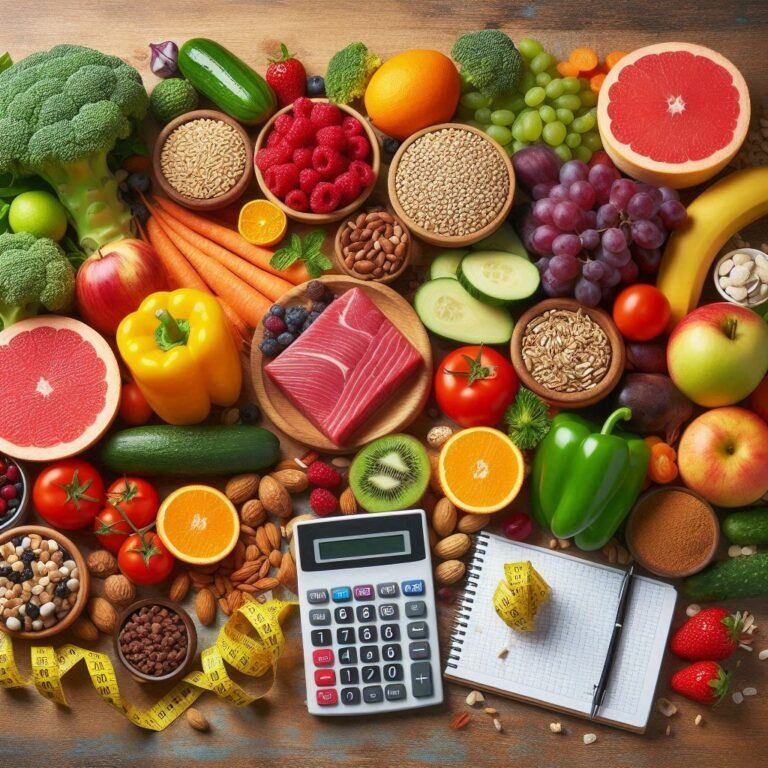How Does Calorie Counting Work With Weight Loss
Today, you’ll discover a powerful tool for weight loss: Calorie Counting. But how does calorie counting work with weight loss? It’s not just about tracking food; it’s about understanding your body’s energy needs. By managing the energy you consume versus what you burn, calorie counting becomes essential for effective weight management.
Now, what is a big part of this equation? Your Basal Metabolic Rate (BMR). BMR is the number of calories your body needs at rest to keep vital functions going. Knowing your BMR is the starting point for an effective calorie-counting strategy. It’s like knowing the amount of fuel your car needs to start and keep running before you add extra for the trip ahead.
But don’t worry too much about the math. There are plenty of calorie tracker apps designed to make this process user-friendly. Choose something that resonates with you. Whether it’s a simple weight loss app or a calorie tracker app that scans barcodes, there’s something on the marketplace to suit your lifestyle and preferences. Some apps even have a diet plan for healthy eating.
Calorie counting isn’t just about numbers; it’s also about making every calorie count nutritionally. A calorie is a measure of energy, and different foods release energy at different rates, not to mention the vitamins, minerals, and other nutrients they provide. To lose weight, aim to fill your calories every day with foods rich in nutrients rather than junk food, like fast food.
Lastly, it’s essential to be realistic about weight management. Set attainable calorie targets to fuel your body sufficiently while creating enough deficit to lose weight. Remember, your first attempt does not need to be the last. You can always adjust your approach down the road.

The Science Behind Calorie Deficit and Weight Reduction
When you strip down weight loss to its core, it’s all about creating a calorie deficit. That’s the gap between the calories you ingest and those you burn. The general rule is to burn about 3,500 calories more than you consume to shed a pound.
How do you work out the calorie deficit tailored to your particular needs? It’s pretty straightforward, with a touch of personalization. You must consider age, sex, weight, height, and activity level. There are a bunch of calculators online or apps that can help you pinpoint a daily calorie intake target.
While the 3,500-calorie rule offers a basic guideline, it could be more flawless. Weight loss is a personal journey, and the process might vary significantly for different people. Factors like metabolic changes, plateaus, and lifestyle adjustments make the math slightly fuzzy.
Now, it isn’t just about cutting back on food. Balancing your macronutrient intake is critical. Proteins, fats, and carbohydrates should all be in the right proportion of your diet. This ensures your body gets what it needs to maintain energy, repair tissues, and function correctly while losing weight.
There are several myths out there about calorie counting and weight loss. Some people may tell you that all calories are equal, but I’ll let you in on something: a calorie isn’t just a calorie. The source of your calories matters because different foods can affect your hunger, hormones, and metabolism.
It’s also worth mentioning that calorie counting can affect people differently psychologically. For some, it’s a helpful tool that keeps them mindful about their food intake. For others, it may lead to an unhealthy obsession with numbers and food control. It’s crucial to stay aware of these risks and seek support if you find calorie counting negatively impacting your mental health.

Sustainable Weight Loss: Beyond the Numbers
I’m here to help you see that sustainable weight loss involves more than tracking every calorie. Focus on the quality of your foods, not just their calorie content. Opt for nutrient-dense foods that provide vitamins, minerals, and other nutrients vital for your health and the diet plan you follow.
You’ll discover that incorporating physical activity into your routine is as important as watching what you eat. Regular exercise boosts your metabolism and helps you burn more calories. Exercising makes it easier to maintain a calorie deficit without severely restricting your food intake.
Don’t worry too much about slipping up now and then; it’s all part of the journey. Consistency over time leads to sustainable results, not perfection on any given day. Find ways to deal with emotional eating and plan for social events where you might be tempted to overindulge.
Choose something that resonates with you when it comes to managing hunger. Whether drinking a glass of water before meals to help you feel fuller or including fiber-rich foods that take longer to digest, find strategies that work for your body and lifestyle.
Also, remember to stay hydrated. Water is an essential tool in weight management. Drinking water boosts metabolism and aids in weight loss by increasing feelings of fullness and decreasing the chances of overeating.
Sometimes, we can trick our bodies into drinking water and mistake thirst for hunger. Before you reach for a snack, try having a glass of water and then reevaluate your hunger levels.
Finally, measure your success by more than just the numbers on the scale. Celebrate non-scale victories like having more energy, fitting into smaller clothes, or receiving compliments from friends and family. These indicators can motivate you and reaffirm that your efforts are paying off in more ways than one.
FAQ Section: Understanding Calorie Counting for Weight Loss
Calorie counting is a fundamental method in weight management, offering a structured approach to monitoring energy intake. Below, we address some common queries to enhance your understanding of this effective strategy:
1. Why didn’t I lose weight on 1200 calories a day?
Weight loss can stall daily due to various factors. Firstly, this calorie threshold may not create a sufficient deficit for some individuals, especially those with lower BMRs or reduced physical activity levels.
Additionally, metabolic adaptation—a phenomenon where the body adjusts to lower calorie intake—can occur, slowing weight loss progress. Moreover, inadequate nutrient intake may impair metabolic processes, hindering weight loss despite calorie restriction.
2. How often should I weigh myself?
Weighing frequency varies based on individual preferences and goals. For most individuals, weighing oneself once a week under consistent conditions (e.g., exact time of day, same scale) provides meaningful feedback on progress while minimizing fluctuations.
However, daily weigh-ins can offer insight into short-term fluctuations, aiding in behavior monitoring. For a comprehensive assessment of progress, it’s essential to focus on overall trends rather than day-to-day changes and prioritize non-scale victories.
3. Does drinking water help you lose weight?
Indeed, water consumption plays a pivotal role in weight loss. Drinking water before meals can promote satiety, reduce calorie intake, and facilitate weight loss efforts. Moreover, staying adequately hydrated supports metabolic processes.
Furthermore, substituting sugary beverages with water reduces calorie consumption and promotes overall health. While water alone isn’t a magical weight loss solution, incorporating it into a balanced lifestyle enhances overall success.
If you found this helpful, read my other post: Can You Drink Tea While Intermittent Fasting?
TIP: Would you like to know your Basal Metabolic Rate (BMR)? Click Here
Engage with Me!
Ask Questions: If you have questions about calorie counting or weight loss apps, please leave them in the comments below. Thank You!



